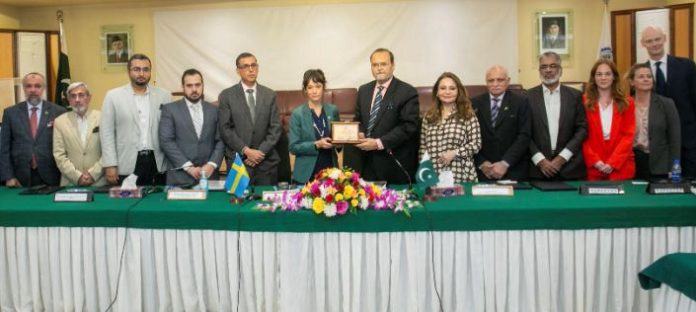DNA
KARACHI: The Ambassador of Sweden Ms. Alexandra Berg von Linde, while commenting on Sweden-Pakistan trade and investment ties, stated that more than 40 Swedish companies have been established in Pakistan, of which many were known Swedish brands and have been present here for many decades but these Swedish companies face challenges including high tax rates when it comes to foreign investment, high energy prices and the difficulties in transferring foreign currencies.
“These companies have supported Pakistan’s growth and are well-acquainted with the complexities of the local business climate,” she said. “While they see the potential for investment here, addressing these challenges is crucial to creating a more conducive environment for foreign investment”, she added while speaking at a meeting with the Karachi Chamber of Commerce & Industry (KCCI).
Honorary Consul General of Sweden Dr. Zeelaf Munir, Senior Vice President Zia ul Arfeen, Vice President Faisal Khalil Ahmed, Chairman Diplomatic Missions & Embassies Liaison Subcommittee Ahsan Arshad Sheikh, Former President Majyd Aziz, and KCCI Managing Committee Members attended the meeting.
Ambassador von Linde emphasized Sweden’s interest in enhancing cooperation with Pakistan, particularly in sustainability, digitalization, and green transitions. “These areas offer a win-win opportunity for both countries,” she added. “For Pakistan to stay competitive and relevant in the EU market, a green transition is essential.”
She further noted that Swedish Business Council in Pakistan has been working actively to promote trade between the two countries by expanding and strengthening business links. “It is an entry point for Swedish companies that are interested in the Pakistani market.”
Commenting on SVP’s remarks about GSP Plus, the Swedish Envoy said, “GSP Plus is an open and generous system that promotes economic growth, and sustainable development. At the same time, we all know that there are conditions attached to the GSP system in terms of implementation of international conventions whether it is about human or labor rights, environmental regulations, or governance principles. I know that Pakistan is working closely and continuously with the European Union to stay aligned with the GSP regulations.”
Ambassador von Linde also noted that Sweden and Pakistan were celebrating 75 years of diplomatic relations this year and the two countries have quite a substantive history together. “During these 75 years, the relationships have evolved which are based on mutual respect and on a partnership that is committed to economic growth and sustainable development.”
She stated, “We are also pleased to see talented and highly educated students traveling from Pakistan to Sweden each year to pursue higher education. These students serve as excellent ambassadors, as they return and contribute with the specialized knowledge they acquired in our country. They either join Swedish companies or launch innovative business ideas in collaboration with Sweden. This, we believe, is one of the highlights of our relationship.”
Earlier, while welcoming the Swedish Ambassador, Senior Vice President KCCI Zia ul Arfeen expressed satisfaction over the recent 18th Bilateral Political Consultations, during which both sides committed to deepening economic collaboration and agreed to coordinate all mutual interests at multilateral forums, including the UN and the EU.
He noted that the EU has consistently been Pakistan’s largest export destination, with exports surpassing the $8 billion mark in FY24 whereas Sweden has emerged as a significant trading partner for Pakistan. “Sweden has consistently supported the growth of trade with Pakistan through the GSP+ framework, and we look forward to its continued valued assistance in this regard”, he said, adding that the EU’s GSP+ offers crucial incentives that enhance Pakistan’s exports to Sweden & other EU nations, having a GDP size of around $18 trillion.
He was of the view that Pakistan’s bilateral trade volume with Sweden is much lower than its full potential, hence, both countries should further enhance this volume to a reasonable level and exploit the available opportunities for further economic integration. “There is immense potential for Swedish investors to explore business and investment opportunities in the Textile sector, agriculture, infrastructure, renewable energy, sustainable technologies, waste management, IT, and healthcare to boost bilateral trade & take advantage of the business-friendly environment in Pakistan”, he added.
He particularly mentioned that collaboration with Swedish tech companies can help Pakistan strengthen its digital infrastructure and improve efficiency in sectors like healthcare, and energy in addition to supporting the development of local tech talent. “Both countries need to improve people-to-people contact, exchange trade delegations, and participate in each other’s fair exhibitions to give a much-needed trade boost for economic integration.”

















